选修七Unit3 Under the Sea-learning about language 精品课件(共48张PPT)
文档属性
| 名称 | 选修七Unit3 Under the Sea-learning about language 精品课件(共48张PPT) | 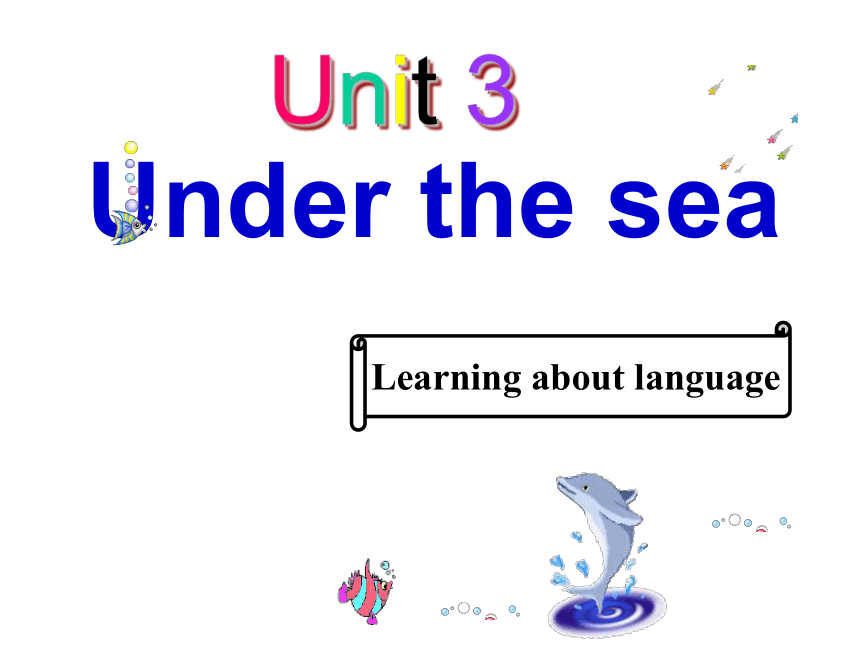 | |
| 格式 | zip | ||
| 文件大小 | 1.7MB | ||
| 资源类型 | 教案 | ||
| 版本资源 | 人教版(新课程标准) | ||
| 科目 | 英语 | ||
| 更新时间 | 2016-04-04 18:51:40 | ||
图片预览

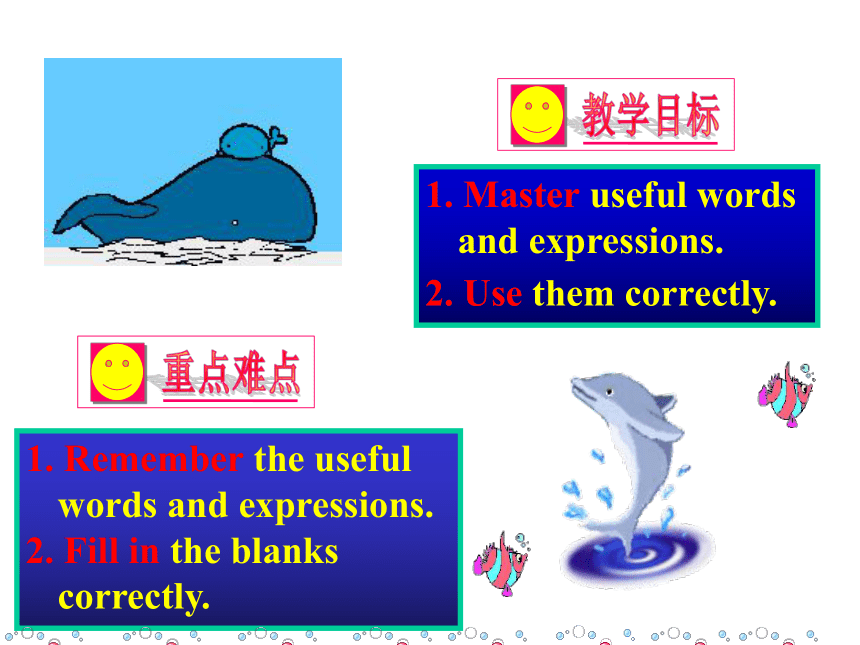
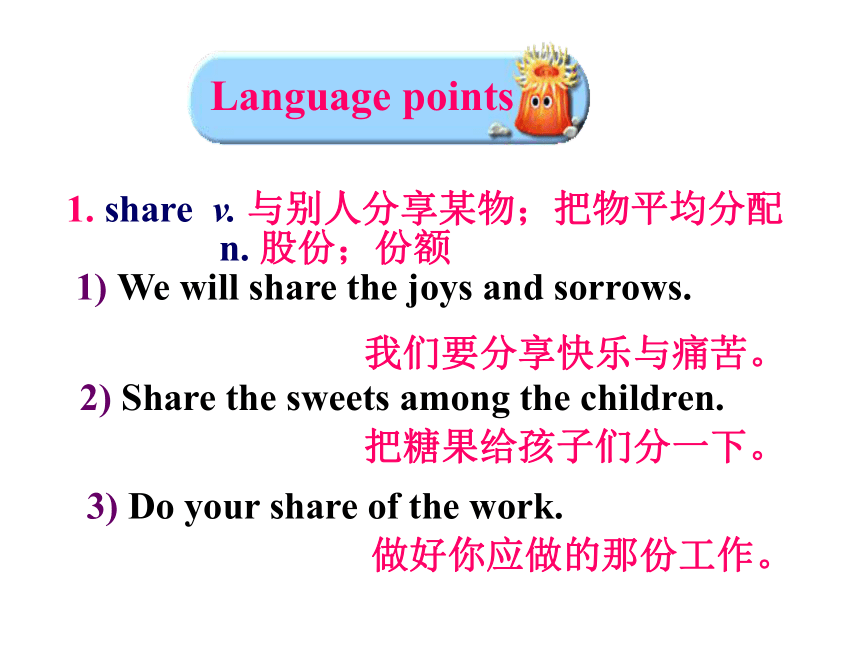
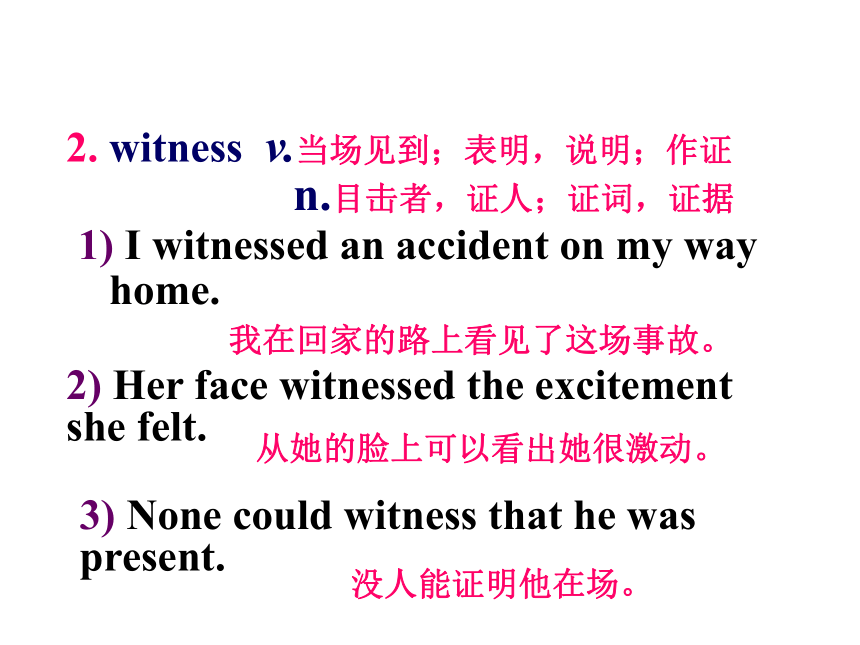
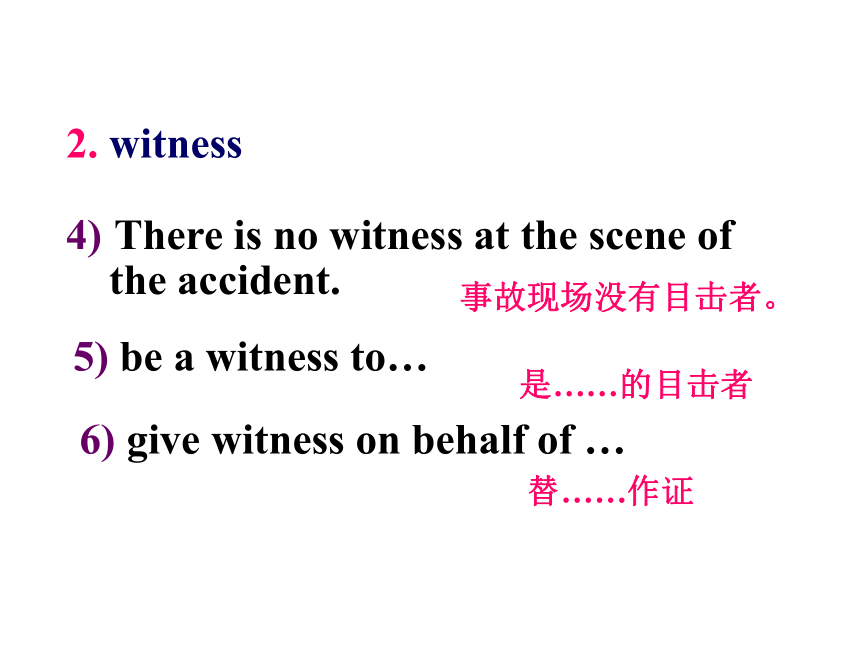
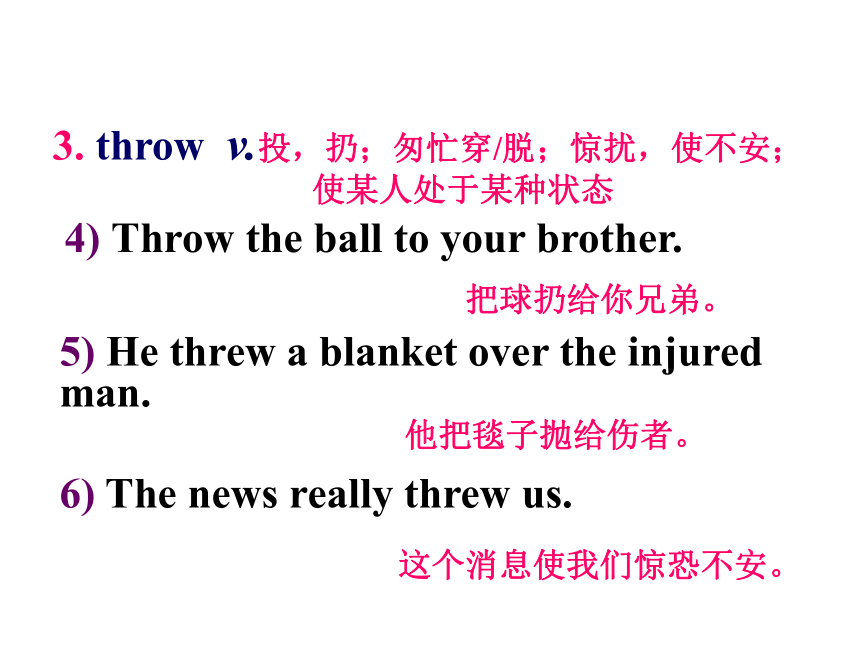
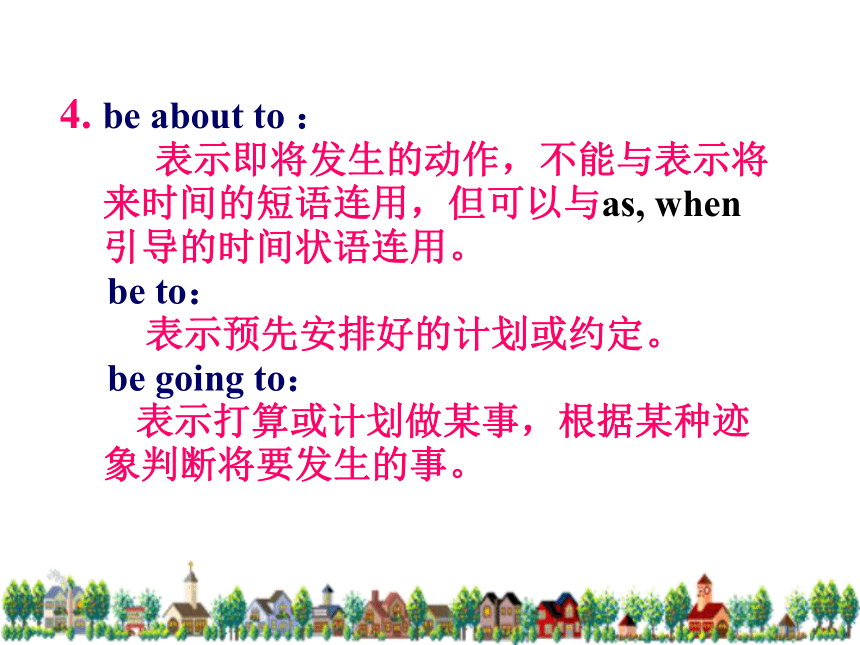
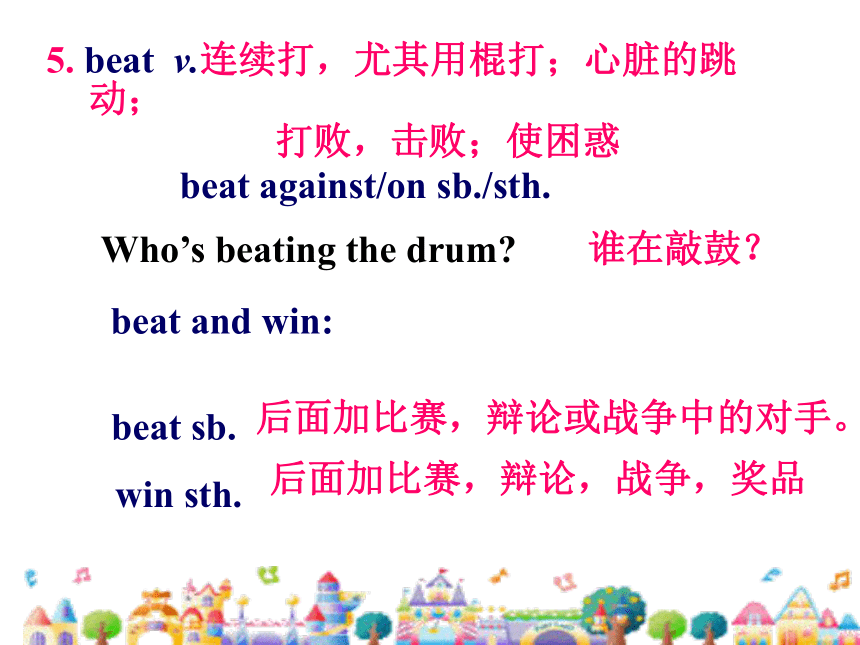
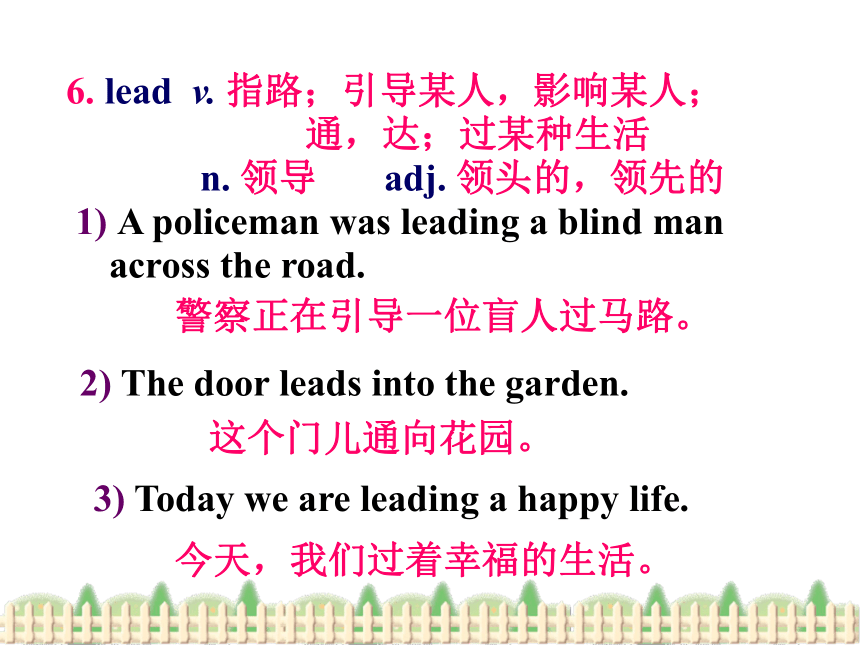
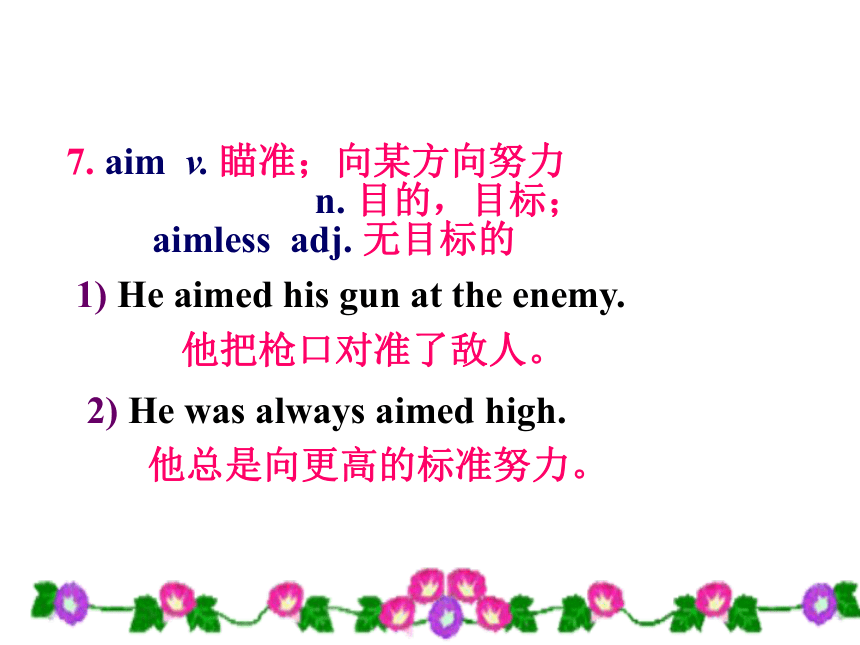
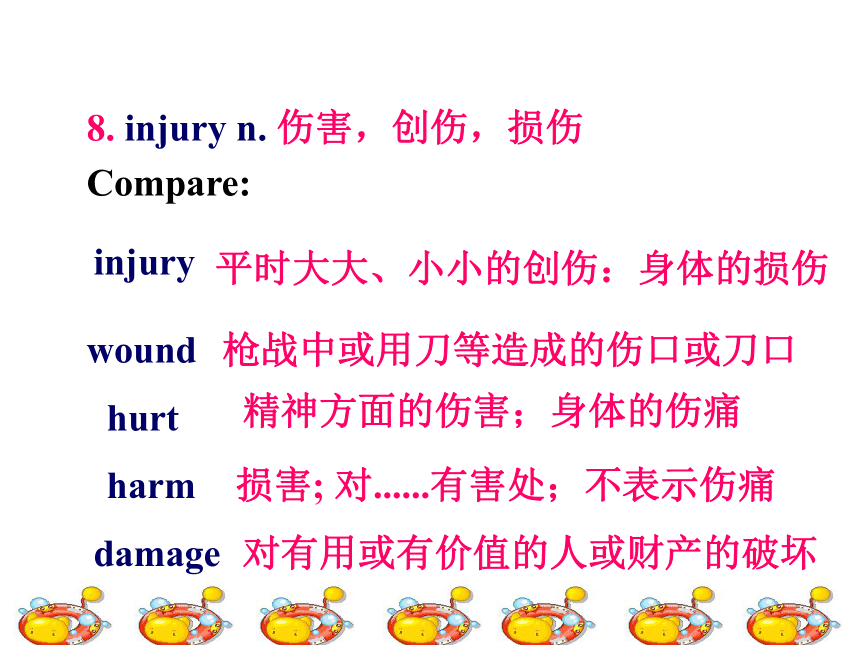
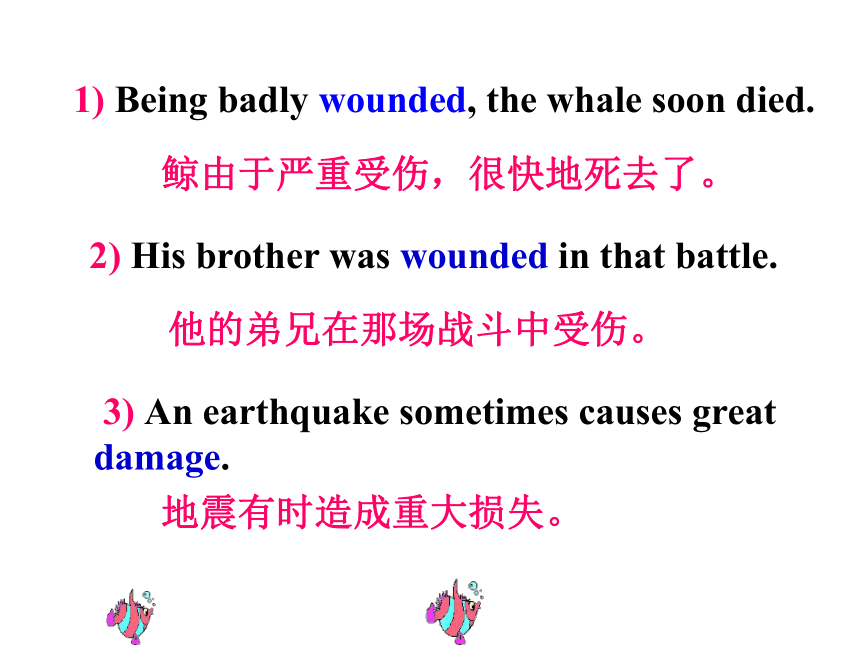
文档简介
课件48张PPT。Under the seaUnit 31. Remember the useful words and expressions.
2. Fill in the blanks correctly.1. Master useful words and expressions.
2. Use them correctly.1. share v. 与别人分享某物;把物平均分配
n. 股份;份额
1) We will share the joys and sorrows.我们要分享快乐与痛苦。2) Share the sweets among the children.把糖果给孩子们分一下。3) Do your share of the work.做好你应做的那份工作。Language points2. witness v.当场见到;表明,说明;作证
n.目击者,证人;证词,证据
1) I witnessed an accident on my way home.我在回家的路上看见了这场事故。2) Her face witnessed the excitement she felt.从她的脸上可以看出她很激动。3) None could witness that he was present.没人能证明他在场。2. witness
4) There is no witness at the scene of the accident.事故现场没有目击者。5) be a witness to… 是……的目击者6) give witness on behalf of …替……作证3. throw v.投,扔;匆忙穿/脱;惊扰,使不安;
使某人处于某种状态
4) Throw the ball to your brother.把球扔给你兄弟。5) He threw a blanket over the injured man.他把毯子抛给伤者。6) The news really threw us.这个消息使我们惊恐不安。4. be about to :
表示即将发生的动作,不能与表示将来时间的短语连用,但可以与as, when 引导的时间状语连用。
be to:
表示预先安排好的计划或约定。
be going to:
表示打算或计划做某事,根据某种迹象判断将要发生的事。5. beat v.连续打,尤其用棍打;心脏的跳动;
打败,击败;使困惑
beat against/on sb./sth.谁在敲鼓?后面加比赛,辩论或战争中的对手。Who’s beating the drum? beat sb. beat and win:win sth.后面加比赛,辩论,战争,奖品6. lead v. 指路;引导某人,影响某人;
通,达;过某种生活
n. 领导 adj. 领头的,领先的
1) A policeman was leading a blind man across the road.警察正在引导一位盲人过马路。2) The door leads into the garden.这个门儿通向花园。3) Today we are leading a happy life.今天,我们过着幸福的生活。7. aim v. 瞄准;向某方向努力
n. 目的,目标;
aimless adj. 无目标的
1) He aimed his gun at the enemy.他把枪口对准了敌人。2) He was always aimed high.他总是向更高的标准努力。8. injury n. 伤害,创伤,损伤
Compare:平时大大、小小的创伤:身体的损伤枪战中或用刀等造成的伤口或刀口精神方面的伤害;身体的伤痛injury损害; 对......有害处;不表示伤痛woundhurtharmdamage对有用或有价值的人或财产的破坏1) Being badly wounded, the whale soon died. 2) His brother was wounded in that battle.鲸由于严重受伤,很快地死去了。他的弟兄在那场战斗中受伤。 3) An earthquake sometimes causes great damage.地震有时造成重大损失。4) He escaped from the accident without any injury. 5) What hurt have you done to them?他毫发无损地从事故中逃脱。你怎样伤害他们了? 6) The drought did a lot of harm to the crops.干旱给庄稼带来许多危害。7) He got serious injuries to the legs at work. 8) He got his finger injured. 在工作中,他腿部严重受伤。他的手指受伤了。9. abandon v. 遗弃;放弃
abandon oneself to 沉迷于;陷入
1) Parents who abandon their baby should be punished.遗弃孩子的父母应该得到惩罚。2) The match was abandoned because of bad weather.由于糟糕的天气,比赛取消了。3) He abandoned himself to despair.他陷入绝望之中。10. accommodation n.房间,住所
膳宿(常用复数);(车, 船, 飞机等的)预定铺位
This hospital has accommodation (s) for 400 patients.这个医院有400个床位。适应,调节亲切的,易打交道的accommodate v.
accommodating adj.
accommodator n.调节者bring out
bring up
bring about 2) Our country has brought in a lot of
advanced technology.11. bring in 收(庄稼);引进;挣得(钱)
1) He brings in a wage of 1000 yuan a month.他每月1000元工资。吐出;抚养,养育带来,造成使(意义等)明白表示出来,生产12. distance n. 距离;远处
v. 保持距离, 关系疏远或冷淡
In the distance we could see that something was happening. 我们能看到远处发生的事情。遥远的distant adj.
distantly adv. 遥远地13.与 distance 相关的短语:at/ from a distance
at a respectful distance
be out of distance
in the distance
within distance离一段距离;从远处敬而远之太远在远处;在远方在......距离内14. 与 throw 相关的短语:throw cold water on…
throw off
throw over
throw away
throw down
throw up泼冷水抛弃,摆脱回棋,变换浪费,拒绝打倒,推翻呕吐15. 与 out of 相关的短语:come about
come across
come forth
come out
come through
come up
come to
come up with发生偶然遇见出来,涌现出版,(花)开(电话)接通走近,上升总计赶上,补充 1. I thought , at the time, that this was just a story but then I witnessed it with my own eyes many times.
at the time “那时候”,位置应在story 之后,作时间状语, 提前是为了强调,that this was just a story作thought 的宾语。Sentences 2. On the afternoon I arrived at the station, as I was sorting out my accommodation, I heard a huge noise coming from the bay.
as: “当……时候”,
在我到达捕鲸场的那个下午,正当我准备膳宿时,我听到一声巨响从海湾传来。 1) as 强调主从句中谓语动词所表示的动作同时发生。
从句表示“随时间推移”连词能用as,不用when 或while。
As the day went on, the weather got worse. 日子一天天过去,天气越变越坏。as, when 和 while? 2) when 可表示瞬间、时间段,主从句动作同时发生,也可以先后发生。当从句的动作发生于主句动作之前,只能用when 引导这个从句,不可用as 或 while。
When you have finished your work, you may have a rest.完成作业后,你就可以休息了。 3) as, when 引导短暂性动作的动词。
When (Just as / Just when) I stopped my car, a man came up to me.
4) while 用于同时进行的两个延续性动作相伴发生,常对同类动作进行对比。3. We ran down to the shore in time to see an enormous animal throwing itself out of the water and then crashing down again.
我们及时赶到岸边,看到一个庞大的动物猛力跃出水面,然后又坠落到水面。 4. Another whaler yelled out, ... This was the call that announced there was about to be a whale hunt.
yell v.& n. 叫;喊
叫声;喊声
1) She yelled with surprise when she saw the present.2) The crowd let out a yell of delight.辨析:
be going to
be to do
be about
to be going to
be to do:
表示预先安排好的计划或约定。表示打算或计划做某事或根据某种迹象判断将要发生的事。 will do 表不是事先经过考虑的将来动作
be going to 表示打算或计划做某事或根 据某种迹象判断将要发生的事。
be to 表示预先安排好的计划或约定。
be about to 表示即将发生的动作,意为“正要,即将”, 不与具体的表将来时间的副词或副词性短语连用, 但可以与when引导的时间状语连用。5. I looked down into the water and could see Old Tom swimming by the boat, showing us the way.
我低头朝水中看去,看到老汤姆正在船边游着,为我们引路。 swimming by the boat 在句中作宾语补足语,与宾语Old Tom 存在逻辑上的主谓头系。
I saw Jack crossing the street.
我看见杰克正在穿过街道。 这是一个 it 作形式主语的句子,真正的主语是不定式to handle the boat。在用不定式、动名词从句作主语的句子里,通常用 it 作形式主语,而把真正的主语后置以避免头重脚轻。
这样的句式通常有:5. … it was difficult to handle the boat. …… 划船很困难。It(形式主语)+ v. It is + adj. to + v.that(主语)+ v.wh- 等词(主语)+ v.ofsb. to do sth.for seems (好像……)
It + appears(看上去……)
happens(碰巧……)
+ that (主语+v.)It is no use v.–ing
做……没有用
It is said (reported) that …
据说,据报道……It is believed that …
人们相信……
It is thought that …
人们认为……
It has been proved that …
事实证明……
It is well-known that …
众所周知…… 6. It took over half an hour to get the boat back to James.
用了半个多小时的时间才把船划回到詹姆斯身边。 这是一个It takes (sb.) some time/sth. to do sth. 的固定句式,take 意为“花费、需要”,take 前也可用具体名词作主语。 It takes him three hours to do his homework everyday.
他每天要用三个小时的时间做作业。
We took extra time to do the job properly.
我们花额外时间来把这顶工作做好。 7. A few minutes later, there was no Tom, so George started beating the water with his oar and there was Tom, circling back to the boat, leading us to the hunt again.
circling back to the boat; leading us to the hunt again 是现在分词短语作状语。1) The little girl _________ her hands to hug her mother .
2) Tom can’t __________his cold .
3) He drank a lot , and he ________ on his way home .
4) As a young man , he __________ much money .
5) He __________ the young man and ran away.threw out throw off threw up threw awaythrew down throw off , throw out , throw away,
throw down, throw up Fill in the blanks using the following Practice ________ you have finished your work, you may have a rest.
____________ I stopped my car, a man came up to me.
____ the day went on, the weather got worse.
____________ was walking down the street, I met an old friend.When When ( As) AsWhen (while)when , as, while Fill in the blanks using the following Don’t go out now, we _____________ have supper .
The wind went down toward sunset . It __________ be fine tomorrow .
The Queen _________ visit Beijing next year.
His sister is 13 years old , and she _____ be 14 years old next year .are about tois going to is to will will , be about to , be to , be going to Fill in the blanks with the following The cost of the journey _______ 3000 yuan.
How did the accident ___________ ?
When will the book __________ ?
I _____________ my teacher in the street yesterday .
The seeds haven’t __________ yet .
The old man ____________the World War I.comes to come aboutcome outcame across come upcame throughcome about , come through, come out , come up, come to , come acrossFill in the blanks with the following He _________ much money on books.
Every morning he _________ an hour in reading.
The book ________ him one dollar.
The journey ________ me three hours.
He _________ the taxi and hurried to the station.spendsspendscosttookpaidspend, cost, take, payFill in the blanks with the following pausewitnessdiveHow used in the textDefinitionsWordurge1. to jump into the water head first
2. a graceful jump into the water head first 1drag1 2 221. to see something happen
2. someone who sees a crime or an accident1. a short time when someone stops s peaking
2. to stop doing something for a short time1. a strong wish
2. a strongly suggest someone do something1. something that slows you down
2. to pull something along behind youExercise 1 on P221. He drove into the sea and swam to the drowning man.
2. She witnessed the accident.
3. After a pause the audience broke into cheers.
4. We urged her to reconsider the offer, but she refused.
5. The time dragged as we waited.Make Sentences1. Some personal stories about Mark Twain are very interesting.
2. Working together is necessary to produce good results.
3. More and more people are concerned with the protection of different whale species.
4. Sit facing the street and watch the parade by .
5. When you hit the iceberg, leave the ship immediately.
anecdotesabandon conservation Team work opposite The Exercise 2 on P221. Writing: Finish Exercise 3 on Page 22.
2. Retell the short passage and write another short passage about yourself.
3. Exchange your writing with your partner.
2. Fill in the blanks correctly.1. Master useful words and expressions.
2. Use them correctly.1. share v. 与别人分享某物;把物平均分配
n. 股份;份额
1) We will share the joys and sorrows.我们要分享快乐与痛苦。2) Share the sweets among the children.把糖果给孩子们分一下。3) Do your share of the work.做好你应做的那份工作。Language points2. witness v.当场见到;表明,说明;作证
n.目击者,证人;证词,证据
1) I witnessed an accident on my way home.我在回家的路上看见了这场事故。2) Her face witnessed the excitement she felt.从她的脸上可以看出她很激动。3) None could witness that he was present.没人能证明他在场。2. witness
4) There is no witness at the scene of the accident.事故现场没有目击者。5) be a witness to… 是……的目击者6) give witness on behalf of …替……作证3. throw v.投,扔;匆忙穿/脱;惊扰,使不安;
使某人处于某种状态
4) Throw the ball to your brother.把球扔给你兄弟。5) He threw a blanket over the injured man.他把毯子抛给伤者。6) The news really threw us.这个消息使我们惊恐不安。4. be about to :
表示即将发生的动作,不能与表示将来时间的短语连用,但可以与as, when 引导的时间状语连用。
be to:
表示预先安排好的计划或约定。
be going to:
表示打算或计划做某事,根据某种迹象判断将要发生的事。5. beat v.连续打,尤其用棍打;心脏的跳动;
打败,击败;使困惑
beat against/on sb./sth.谁在敲鼓?后面加比赛,辩论或战争中的对手。Who’s beating the drum? beat sb. beat and win:win sth.后面加比赛,辩论,战争,奖品6. lead v. 指路;引导某人,影响某人;
通,达;过某种生活
n. 领导 adj. 领头的,领先的
1) A policeman was leading a blind man across the road.警察正在引导一位盲人过马路。2) The door leads into the garden.这个门儿通向花园。3) Today we are leading a happy life.今天,我们过着幸福的生活。7. aim v. 瞄准;向某方向努力
n. 目的,目标;
aimless adj. 无目标的
1) He aimed his gun at the enemy.他把枪口对准了敌人。2) He was always aimed high.他总是向更高的标准努力。8. injury n. 伤害,创伤,损伤
Compare:平时大大、小小的创伤:身体的损伤枪战中或用刀等造成的伤口或刀口精神方面的伤害;身体的伤痛injury损害; 对......有害处;不表示伤痛woundhurtharmdamage对有用或有价值的人或财产的破坏1) Being badly wounded, the whale soon died. 2) His brother was wounded in that battle.鲸由于严重受伤,很快地死去了。他的弟兄在那场战斗中受伤。 3) An earthquake sometimes causes great damage.地震有时造成重大损失。4) He escaped from the accident without any injury. 5) What hurt have you done to them?他毫发无损地从事故中逃脱。你怎样伤害他们了? 6) The drought did a lot of harm to the crops.干旱给庄稼带来许多危害。7) He got serious injuries to the legs at work. 8) He got his finger injured. 在工作中,他腿部严重受伤。他的手指受伤了。9. abandon v. 遗弃;放弃
abandon oneself to 沉迷于;陷入
1) Parents who abandon their baby should be punished.遗弃孩子的父母应该得到惩罚。2) The match was abandoned because of bad weather.由于糟糕的天气,比赛取消了。3) He abandoned himself to despair.他陷入绝望之中。10. accommodation n.房间,住所
膳宿(常用复数);(车, 船, 飞机等的)预定铺位
This hospital has accommodation (s) for 400 patients.这个医院有400个床位。适应,调节亲切的,易打交道的accommodate v.
accommodating adj.
accommodator n.调节者bring out
bring up
bring about 2) Our country has brought in a lot of
advanced technology.11. bring in 收(庄稼);引进;挣得(钱)
1) He brings in a wage of 1000 yuan a month.他每月1000元工资。吐出;抚养,养育带来,造成使(意义等)明白表示出来,生产12. distance n. 距离;远处
v. 保持距离, 关系疏远或冷淡
In the distance we could see that something was happening. 我们能看到远处发生的事情。遥远的distant adj.
distantly adv. 遥远地13.与 distance 相关的短语:at/ from a distance
at a respectful distance
be out of distance
in the distance
within distance离一段距离;从远处敬而远之太远在远处;在远方在......距离内14. 与 throw 相关的短语:throw cold water on…
throw off
throw over
throw away
throw down
throw up泼冷水抛弃,摆脱回棋,变换浪费,拒绝打倒,推翻呕吐15. 与 out of 相关的短语:come about
come across
come forth
come out
come through
come up
come to
come up with发生偶然遇见出来,涌现出版,(花)开(电话)接通走近,上升总计赶上,补充 1. I thought , at the time, that this was just a story but then I witnessed it with my own eyes many times.
at the time “那时候”,位置应在story 之后,作时间状语, 提前是为了强调,that this was just a story作thought 的宾语。Sentences 2. On the afternoon I arrived at the station, as I was sorting out my accommodation, I heard a huge noise coming from the bay.
as: “当……时候”,
在我到达捕鲸场的那个下午,正当我准备膳宿时,我听到一声巨响从海湾传来。 1) as 强调主从句中谓语动词所表示的动作同时发生。
从句表示“随时间推移”连词能用as,不用when 或while。
As the day went on, the weather got worse. 日子一天天过去,天气越变越坏。as, when 和 while? 2) when 可表示瞬间、时间段,主从句动作同时发生,也可以先后发生。当从句的动作发生于主句动作之前,只能用when 引导这个从句,不可用as 或 while。
When you have finished your work, you may have a rest.完成作业后,你就可以休息了。 3) as, when 引导短暂性动作的动词。
When (Just as / Just when) I stopped my car, a man came up to me.
4) while 用于同时进行的两个延续性动作相伴发生,常对同类动作进行对比。3. We ran down to the shore in time to see an enormous animal throwing itself out of the water and then crashing down again.
我们及时赶到岸边,看到一个庞大的动物猛力跃出水面,然后又坠落到水面。 4. Another whaler yelled out, ... This was the call that announced there was about to be a whale hunt.
yell v.& n. 叫;喊
叫声;喊声
1) She yelled with surprise when she saw the present.2) The crowd let out a yell of delight.辨析:
be going to
be to do
be about
to be going to
be to do:
表示预先安排好的计划或约定。表示打算或计划做某事或根据某种迹象判断将要发生的事。 will do 表不是事先经过考虑的将来动作
be going to 表示打算或计划做某事或根 据某种迹象判断将要发生的事。
be to 表示预先安排好的计划或约定。
be about to 表示即将发生的动作,意为“正要,即将”, 不与具体的表将来时间的副词或副词性短语连用, 但可以与when引导的时间状语连用。5. I looked down into the water and could see Old Tom swimming by the boat, showing us the way.
我低头朝水中看去,看到老汤姆正在船边游着,为我们引路。 swimming by the boat 在句中作宾语补足语,与宾语Old Tom 存在逻辑上的主谓头系。
I saw Jack crossing the street.
我看见杰克正在穿过街道。 这是一个 it 作形式主语的句子,真正的主语是不定式to handle the boat。在用不定式、动名词从句作主语的句子里,通常用 it 作形式主语,而把真正的主语后置以避免头重脚轻。
这样的句式通常有:5. … it was difficult to handle the boat. …… 划船很困难。It(形式主语)+ v. It is + adj. to + v.that(主语)+ v.wh- 等词(主语)+ v.ofsb. to do sth.for seems (好像……)
It + appears(看上去……)
happens(碰巧……)
+ that (主语+v.)It is no use v.–ing
做……没有用
It is said (reported) that …
据说,据报道……It is believed that …
人们相信……
It is thought that …
人们认为……
It has been proved that …
事实证明……
It is well-known that …
众所周知…… 6. It took over half an hour to get the boat back to James.
用了半个多小时的时间才把船划回到詹姆斯身边。 这是一个It takes (sb.) some time/sth. to do sth. 的固定句式,take 意为“花费、需要”,take 前也可用具体名词作主语。 It takes him three hours to do his homework everyday.
他每天要用三个小时的时间做作业。
We took extra time to do the job properly.
我们花额外时间来把这顶工作做好。 7. A few minutes later, there was no Tom, so George started beating the water with his oar and there was Tom, circling back to the boat, leading us to the hunt again.
circling back to the boat; leading us to the hunt again 是现在分词短语作状语。1) The little girl _________ her hands to hug her mother .
2) Tom can’t __________his cold .
3) He drank a lot , and he ________ on his way home .
4) As a young man , he __________ much money .
5) He __________ the young man and ran away.threw out throw off threw up threw awaythrew down throw off , throw out , throw away,
throw down, throw up Fill in the blanks using the following Practice ________ you have finished your work, you may have a rest.
____________ I stopped my car, a man came up to me.
____ the day went on, the weather got worse.
____________ was walking down the street, I met an old friend.When When ( As) AsWhen (while)when , as, while Fill in the blanks using the following Don’t go out now, we _____________ have supper .
The wind went down toward sunset . It __________ be fine tomorrow .
The Queen _________ visit Beijing next year.
His sister is 13 years old , and she _____ be 14 years old next year .are about tois going to is to will will , be about to , be to , be going to Fill in the blanks with the following The cost of the journey _______ 3000 yuan.
How did the accident ___________ ?
When will the book __________ ?
I _____________ my teacher in the street yesterday .
The seeds haven’t __________ yet .
The old man ____________the World War I.comes to come aboutcome outcame across come upcame throughcome about , come through, come out , come up, come to , come acrossFill in the blanks with the following He _________ much money on books.
Every morning he _________ an hour in reading.
The book ________ him one dollar.
The journey ________ me three hours.
He _________ the taxi and hurried to the station.spendsspendscosttookpaidspend, cost, take, payFill in the blanks with the following pausewitnessdiveHow used in the textDefinitionsWordurge1. to jump into the water head first
2. a graceful jump into the water head first 1drag1 2 221. to see something happen
2. someone who sees a crime or an accident1. a short time when someone stops s peaking
2. to stop doing something for a short time1. a strong wish
2. a strongly suggest someone do something1. something that slows you down
2. to pull something along behind youExercise 1 on P221. He drove into the sea and swam to the drowning man.
2. She witnessed the accident.
3. After a pause the audience broke into cheers.
4. We urged her to reconsider the offer, but she refused.
5. The time dragged as we waited.Make Sentences1. Some personal stories about Mark Twain are very interesting.
2. Working together is necessary to produce good results.
3. More and more people are concerned with the protection of different whale species.
4. Sit facing the street and watch the parade by .
5. When you hit the iceberg, leave the ship immediately.
anecdotesabandon conservation Team work opposite The Exercise 2 on P221. Writing: Finish Exercise 3 on Page 22.
2. Retell the short passage and write another short passage about yourself.
3. Exchange your writing with your partner.
